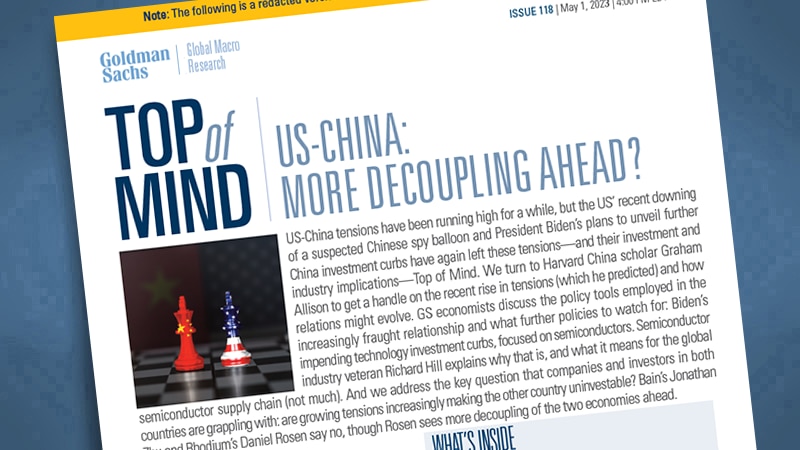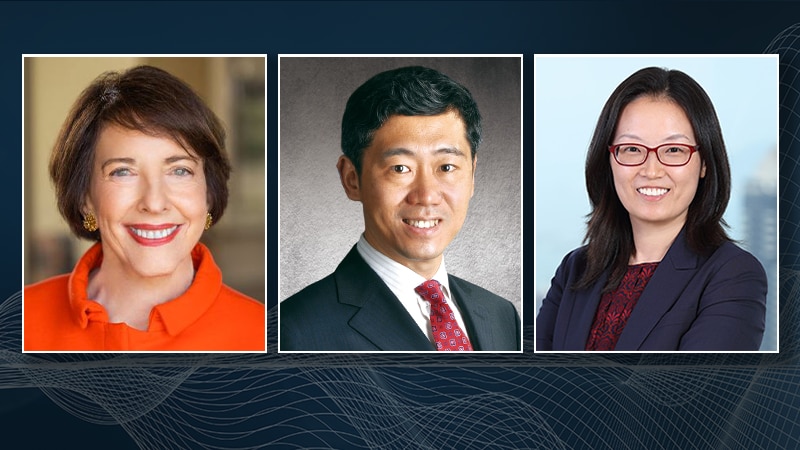As China's leadership implements reforms to increase the country's domestic consumption and reduce dependence on exports, the long-term implications for the global economy are profound.
Latest

Will the rebound in Chinese stocks continue?
China’s equity markets have showed signs of a comeback. A recovery of confidence in the broad economy as well as the equity market, albeit slow, may be gathering momentum, according to Goldman Sachs Asset Management.

Is China’s rebound for real?
After better-than-expected economic data kicking off the year, and a blistering start for the equity market, where does China go from here? Goldman Sachs Research’s Hui Shan and Kinger Lau discuss the evolution of China’s economy and capital markets.

What China’s struggling property sector means for the global economy and markets
China’s property sector has remained under pressure, hobbling the country’s recovery and weighing on global economic growth. In this episode, Goldman Sachs Research’s Kenneth Ho, Asia credit strategist, Hui Shan, chief China economist, and Yi Wang, head of the China real estate team, discuss the implications and the road ahead.

Is China’s economy facing Japanification?
As China’s economy sputters, investors are asking whether the country could repeat Japan’s experience in the 1990s. Goldman Sachs Research finds that even though there are some key similarities between the two situations, China’s “Japanification” is far from certain.

Are higher rates the new normal?
Markets are currently “priced for perfection,” according to some market observers. What factors into that analysis, and what might be missing? Greg Tuorto, a portfolio manager on the fundamental equity team in Goldman Sachs Asset Management, discusses the latest from the Fed, China’s economy, and the new normal of higher rates.

China’s currency rises in cross-border trade but remains limited globally
China’s renminbi has gained market share in international payments, particularly in the country’s own cross-border transactions, as policymakers push for the currency to be used more widely. But the renminbi’s use remains limited globally, especially relative to the size of China’s GDP and its influence in trade, according to Goldman Sachs Research.

What’s next for China’s economy?
China's emergence from Covid lockdowns was expected to boost the global economy. But a string of disappointing data is giving investors, policymakers and market watchers a new reason to worry. Goldman Sachs Research’s Hui Shan, chief China economist, explains the drivers behind the outlook for the world’s second-largest economy.

Why has youth unemployment risen so much in China?
Even as China’s economy has surged following the dismantling of zero-Covid restrictions, youth unemployment has stayed stubbornly high. Part of the reason is probably because of a mismatch between the jobs young people are studying for and the roles that are available, according to Goldman Sachs Research.

Why the ‘great de-stocking’ in oil and commodities could pave the way for future gains
Oil and commodity prices have fallen this year amid unprecedented declines in inventories. But this “great de-stocking” could also pave the way for strong gains if the economy avoids a recession given solid fundamentals and overall demand, explains Jeff Currie, global head of commodities in Goldman Sachs Research.

U.S.-China: More Decoupling Ahead?
Geopolitical tensions between the U.S. and China have been running high for some time, but are escalating as President Biden prepares to unveil further curbs on U.S. investment to China ahead of this month’s G7 Summit. In this episode, which breaks down Goldman Sachs Research’s recent Top of Mind report, “U.S.-China: more decoupling ahead,” Harvard’s Graham Allison, who has extensively studied the relationship between the two countries, and Rhodium Group’s Dan Rosen, who has analyzed investment and trade flows, explore the tensions between the two countries and how they’re affecting the investing landscape for companies and investors.

US-China: More Decoupling Ahead?
US-China tensions have been running high for a while, but the US’ downing of a suspected Chinese spy balloon earlier this year, increasingly hostile rhetoric between the two countries, and, most recently, President Biden’s plans to unveil further China investment curbs have again left these tensions—and their investment and industry implications—Top of Mind.

China May Reach Energy Self-Sufficiency by 2060
Rapid expansion of solar and wind has China on pace to triple government goals by 2030, setting the country on a path to full energy independence in the coming decades.

China’s Biggest Opportunities in Online Gaming May Be Outside China
China’s online gaming market is the biggest in the world, but the most compelling opportunity for its native game developers and publishers might be capturing more users outside its borders, according to Goldman Sachs Research.

As China Reopens, What’s Ahead for Commodities in 2023?
Commodities were the best-performing asset class in 2022 but have recently taken a hit as recession fears loom. So what's in store for them in 2023? In this episode of Exchanges at Goldman Sachs, Jeff Currie, global head of commodities research, explains why commodities are poised to outperform.

China’s Reopening from Covid Likely Won’t Be Straightforward
China relaxed some of its Covid rules this week as the country edges closer to an exit from its zero-Covid policy. But don’t expect a speedy and smooth transition to a full reopening of China’s economy.

China's Reopening Could Drive Stocks Up 20%
A full reopening of the China could drive a 20% increase in Chinese stocks, potentially adding $2.6 trillion to the equity market, according to Goldman Sachs Research.

China’s Congress:
An Inflection Point?
The 20th Party Congress of the Chinese Communist Party, which kicked off on Sunday, promises to be one of the most significant events for China in modern history, not only because President Xi Jinping is widely expected to secure an unprecedented third term, but also because it comes amid the country’s slowest pace of growth in decades. So, whether the Congress marks an inflection point for economic policy is Top of Mind. In the latest episode of Exchanges at Goldman Sachs, Susan Shirk, chair of the 21st Century China Center at UC San Diego, David Li, professor at Tsinghua University, and Hui Shan, Goldman Sachs Research’ chief China economist, discuss what to watch for that could presage a policy inflection, what that inflection may look like, and what it could mean for growth. This episode is based on GIR’s Allison Nathan’s latest Top of Mind report.

China's Congress:
An Inflection Point?
The 20th Party Congress of the Chinese Communist Party promises to be one of the most significant events in China’s modern history, not only because President Xi is widely expected to secure a rare third term, but also as it comes amid the country’s slowest pace of growth in decades. Whether the Congress marks an inflection point for economic policy, and what that means for growth and markets, is Top of Mind.

Ian Bremmer, President of the Eurasia Group and Author of “The Power of Crisis”
Ian Bremmer, president of the Eurasia Group and author of the book, “The Power of Crisis,” discusses the foreign policy implications of Russia’s invasion of Ukraine, and shares his insights on a series of challenges that are poised to reshape the global order over the next decade.

Why Some Homebuyers in China Are Boycotting Their Mortgage Payments
As property developers run out of funding to finish properties, a growing number of buyers in China have stopped making mortgage payments on incomplete homes. The boycotts are a sign of the distress in China’s property market as the government seeks to rebalance the sector.

China Agriculture: Addressing China Food Security - Revolution of Tradition
As food supply faces increasing challenges due to cyclical and disruptive factors, and structurally heightened risks from climate change, Goldman Sachs Research analysts view agriculture efficiency as an essential part of the long-term solution for food security. And for China, much can be done in revolutionizing the efficiency as smarter agriculture thrives.

Is Optimism Returning for China's Internet Companies?
China’s digital champions have been buffeted by uncertainty on three fronts: COVID-19 measures, regulatory tightening and the risk of delisting from US stock markets. We sat down with Ronald Keung, the head of Goldman Sachs Research’s Asia internet team to discuss the recovery of China’s internet sector following a period of weaker earnings. Looking beyond the near-term COVID impact, Keung says that the outlook remains promising for investors.

How China’s ‘Perfect Storm’ and Economic Headwinds Are Affecting Markets and Investors
As COVID-19 lockdowns in China threaten to further upend supply chains and the global economy, investors are reevaluating their exposure to China. In the latest episode of Exchanges at Goldman Sachs, Goldman Sachs Research’s Kinger Lau, chief equity strategist in Macro Research, and Hui Shan, Goldman Sachs’ chief China economist, discuss the outlook for China’s economy and markets.

China Lockdowns Risk Supply Line Fractures
New COVID restrictions may impede local economic activity, risking global supply lines.

Outlook for China’s Property Sector
Are there signs of healing in China’s property sector? When the indebted property giant China Evergrande Group started defaulting on its payments last fall, fear spread that a potential bankruptcy would trigger a broader crisis in China’s debt markets — and global markets more broadly. Several months later, defaults on Chinese property bonds continue to remain elevated. We spoke with Kenneth Ho from Goldman Sachs Research and Salman Niaz of Goldman Sachs Asset Management for their views on Chinese property credit and the Asia high-yield sector more broadly to understand what has changed.

A Shares in Anatomy: 'A' Primer for Global Investors
At a time when some investors are questioning the investability of Chinese assets due to significant regulation and growth concerns, Goldman Sachs Research believes China A shares, a US$14tn asset class, have become more investable given the ongoing liberalization and reform measures in the Chinese capital markets.

The Case for Investing in Emerging Markets Beyond China
Is there a case for dropping China from emerging market (EM) indices? We sat down with Goldman Sachs Research’s Timothy Moe and Sunil Koul to discuss the drivers behind the growing debate to invest in EMs, without China.

Is China Investable?
As the Chinese government continues to carry out unprecedented regulatory tightening, what does the new environment mean for China’s growth and investment outlook? Goldman Sachs Research senior strategist and creator of the firm’s Top of Mind report, Allison Nathan, speaks with China watchers to better understand the motivations behind the government’s actions and whether they mark a meaningful shift in the relationship between the government and the private sector in China.

Is China Investable?
As the Chinese government continues to carry out unprecedented regulatory tightening, what the new regulatory environment means for China’s growth, investment outlook and beyond is Top of Mind.

How Are Investors Navigating China’s Regulatory Uncertainty?
Goldman Sachs’ Stephanie Hui, Basak Yavuz and Prakriti Sofat of the Asset Management Division describe the impact of China's heightened regulatory scrutiny on the capital markets and the implications for investors.

China’s Path to Carbon Neutral: Addressing the Upstream
Trina Chen, co-head of Goldman Sachs’ China Equity Research, discusses China’s plan to reduce emissions from its upstream commodity sectors—which account for more than 10% of the world’s emissions—as part of the country’s pledge to be carbon neutral by 2060.

The Impact of China’s Shrinking Population
With China’s shrinking working-age population expected to have a widespread impact on its economy, we sat down with Goldman Sachs Research’s Maggie Wei, who recently published research analyzing the implications.

The Rising Power of China’s New Consumer Class
With private consumption set to double to $13 trillion by 2030, Goldman Sachs’ Stephanie Hui explains how China’s consumer spending habits are evolving in The Daily Check-In.

The Outlook for China’s Beauty Sector
Christine Cho, equity analyst for Goldman Sachs Research, discusses the resilience of the Chinese beauty market and her outlook for record consumption in 2021.

What’s Ahead for China’s Growth in 2021
More than one year into the pandemic and in the wake of the conclusion of China’s 14th National People’s Congress, investors are focusing on how the country will achieve its announced growth target of 6%. At a recent Goldman Sachs Asset Management Forum session, Prakriti Sofat, a portfolio manager who invests in emerging markets, explained the key economic drivers for China this year.

China Net Zero: The Clean Tech Revolution
Sharmini Chetwode, head of ESG Research in Asia for Goldman Sachs Research, discusses China’s pledge to be carbon neutral by 2060 and the key technologies that will be critical to achieving this target.

China’s New Digital Currency Initiative
Andrew Tilton, chief Asia economist for Goldman Sachs Research, talks about China's new digital currency initiative and its potential implications for consumers, banks and the Chinese economy.

Carbonomics: China Net Zero - The Clean Tech Revolution
China’s pledge to achieve net zero carbon by 2060 represents two-thirds of the c.48% of global emissions from countries that have pledged net zero, and could transform China's economy, starting with the 14th Five-Year Plan.

Markets Update: Investors Assess U.S.-China Risks
Michael Cassell of Global Markets gives a quick update on how investors are approaching market risks, from US-China tensions to ongoing COVID-19 uncertainty.

Analyzing China’s Consumer Behavior
Michelle Cheng, equity analyst for Goldman Sachs Research, discusses the framework her team is using to analyze consumer behavior in China and the key data points they are focused on to forecast long-term growth across a range of retail categories.
Tracking China’s Economic Recovery
Trina Chen, co-head of Goldman Sachs’ China Equity Research, shares trends she’s seeing in her team’s aggregated demand tracker, which measures recovery in a wide range of industrial and consumer data points.

Adm. Timothy J. Keating, USN (Ret.) and Brig. Gen. Robert S. Spalding III, USAF (Ret.)
In this episode of Talks at GS, Admiral Timothy Keating, the former Commander of the US Pacific Command, and Brigadier General Robert S. Spalding III, the former Senior Director for Strategic Planning at the National Security Council, discuss coronavirus and the geopolitical implications for China.

5G’s Future in China
The race to roll out 5G networks is accelerating across the globe, with US-China trade tensions putting equipment makers in the spotlight. For China, the transition to faster wireless should bring a wave of opportunities for technology stocks, from increased semiconductor demand to a surge in consumer device upgrades, says Goldman Sachs Research’s Allen Chang. We sat down with him to learn more about the scope of the opportunity and how trade tensions could impact rollout. Learn More

Hugh Herr, Co-Director of MIT Center for Extreme Bionics
In this episode, filmed at the Builders + Innovators Summit in Asia, MIT Media Lab professor Hugh Herr, who lost his legs in a climbing accident, discusses how technological innovations have altered the future for people with physical disabilities. Watch Video

Weijian Shan, Group Chairman and CEO of PAG Group
Chinese business leader Weijian Shan discusses the lessons learned from his exile to the Gobi Desert at age 15, the lasting implications of Mao’s Cultural Revolution and his observations on the US-China relationship. Watch Video

Rising US-China Trade Concerns: What’s at Stake
The China-US relationship is about more than just trade. While the proposed tariffs on China’s exports into the US represent an effort to correct the trade imbalance between the two countries, what’s just as important is the investment relationship which has expanded in recent years, explains Faryar Shirzad of Goldman Sachs. Watch Video


